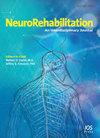对意识障碍患者进行音乐、职业、物理和语言治疗干预:综述
IF 1.8
4区 医学
Q3 CLINICAL NEUROLOGY
引用次数: 0
摘要
背景:当前的临床指南建议,由包括专职医疗人员在内的多学科团队对意识障碍进行评估和干预。专职医疗人员包括音乐、职业、物理和语言治疗师。由于缺乏有关支持意识恢复的康复干预措施的循证建议,这些专职医疗人员在选择干预措施时面临挑战。本综述综合了现有的系统综述(SR),这些综述描述了针对意识障碍患者的职业、言语和语言、物理和/或音乐治疗干预措施。目的:确定并总结系统综述(SR)中的证据,这些综述研究了针对意识障碍患者的联合医疗干预措施。此外,本综述还旨在评估联合医疗干预对意识恢复的影响、所纳入系统综述的方法学质量和偏倚风险。方法:我们完成了一项总体综述。该综述根据《综述首选报告项目》(PRIOR)指南进行报告。在五个学术数据库(PubMed、CINAHL、PsycInfo、Web of Science 和 Cochrane Library)中检索了有关联合健康(即音乐、职业、物理和语言治疗)干预意识障碍的 SR 和/或荟萃分析。对于纳入的研究,采用系统综述评估测量工具(AMSTAR)2 核对表提取数据并评估SR的质量。从每篇 SR 中提取的数据确定了主要研究的作者和年份、干预措施、比较者以及与意识恢复(即神经行为/认知)、功能状态、生理反应疼痛和不良事件相关的结果。对康复干预措施进行了分类和描述。结果:共纳入 15 篇综述,其中 3 篇进行了荟萃分析。确定的康复干预措施包括1)感觉刺激;2)正中神经刺激;3)通过辅助技术进行交流/环境控制;4)移动;5)音乐治疗。研究报告发表于 2002 年至 2022 年之间,共纳入 2286 名参与者。根据 AMSTAR 2,综述质量分为极低(k = 6)、低(k = 3)、中(k = 4)和高(k = 2)。本综述中的研究报告显示,主要研究中评估意识恢复的研究方法和结果测量方法存在显著异质性。这些因素影响了进行荟萃分析的能力。结论:感官刺激、正中神经刺激、音乐疗法和动员都是能证明一定程度获益的干预措施,但目前的SR未能通过高质量的证据证明其获益。毋庸置疑,有必要继续开展康复研究,以扩大治疗方式的选择范围,并确保应用于DoC康复的干预措施以证据为基础,从而改善患者的意识和康复状况。本文章由计算机程序翻译,如有差异,请以英文原文为准。
Music, occupational, physical, and speech therapy interventions for patients in disorders of consciousness: An umbrella review
BACKGROUND:
Current clinical guidelines recommend that a multidisciplinary team inclusive of allied healthcare practitioners deliver assessment and intervention for disorders of consciousness. Allied health professionals include music, occupational, physical, and speech therapists. These allied health clinicians are challenged to select interventions due to a lack of evidence-based recommendations regarding rehabilitation interventions that support recovery of consciousness. This umbrella review synthesizes available systematic reviews (SRs) that describe occupational, speech and language, physical and/or musical therapeutic interventions for people with disorders of consciousness. OBJECTIVES:
Identify and summarize evidence from systematic reviews (SRs) that examine allied healthcare interventions for patients with disorders of consciousness. Additionally, this umbrella review aims to evaluate the impact of allied health interventions on recovery of consciousness, methodological quality and risk of bias for the included systematic reviews. METHODS:
An umbrella review was completed. The review was reported according to the Preferred Reporting Items for Overview of Reviews (PRIOR) guidance. Five academic databases (PubMed, CINAHL, PsycInfo, Web of Science, and the Cochrane Library) were searched for SRs and/or meta-analyses of allied health (i.e., music, occupational, physical, and speech therapy) interventions for disorders of consciousness. For included studies, data were extracted and quality of the SRs appraised using the A Measurement Tool to Assess Systematic Reviews (AMSTAR) 2 checklist. Data extracted from each SR identified the authors and years of primary studies, interventions, comparators, and outcomes related to recovery of consciousness (i.e., neurobehavioral/cognitive), functional status, physiological response pain, and adverse events. Rehabilitation interventions were categorized and described. RESULTS: Fifteen SRs were included and three of these reviews conducted meta-analyses. Identified rehabilitation interventions included: 1) sensory stimulation, 2) median nerve stimulation, 3) communication/environmental control through assistive technology, 4) mobilization, and 5) music-based therapy. SRs were published between 2002 and 2022 and included 2286 participants. Using the AMSTAR 2, the quality of reviews was critically low (k = 6), low (k = 3), moderate (k = 4), and high (k = 2). SRs within this umbrella review demonstrated significant heterogeneity in research methods and use of outcome measures to evaluate the recovery of consciousness within the primary studies. These factors influenced the ability to conduct meta-analyses. CONCLUSIONS:Sensory stimulation, median nerve stimulation, music therapy and mobilization are all interventions that demonstrate some level of benefit, but current SRs fail to prove benefit through high-level quality evidence. There is an indisputable need for continued rehabilitation research to expand options for treatment modalities and to ensure that the interventions being applied to DoC rehabilitation are evidence-based to improve consciousness and recovery.
求助全文
通过发布文献求助,成功后即可免费获取论文全文。
去求助
来源期刊

NeuroRehabilitation
CLINICAL NEUROLOGY-REHABILITATION
CiteScore
3.20
自引率
0.00%
发文量
178
审稿时长
6-12 weeks
期刊介绍:
NeuroRehabilitation, an international, interdisciplinary, peer-reviewed journal, publishes manuscripts focused on scientifically based, practical information relevant to all aspects of neurologic rehabilitation. We publish unsolicited papers detailing original work/research that covers the full life span and range of neurological disabilities including stroke, spinal cord injury, traumatic brain injury, neuromuscular disease and other neurological disorders.
We also publish thematically organized issues that focus on specific clinical disorders, types of therapy and age groups. Proposals for thematic issues and suggestions for issue editors are welcomed.
 求助内容:
求助内容: 应助结果提醒方式:
应助结果提醒方式:


